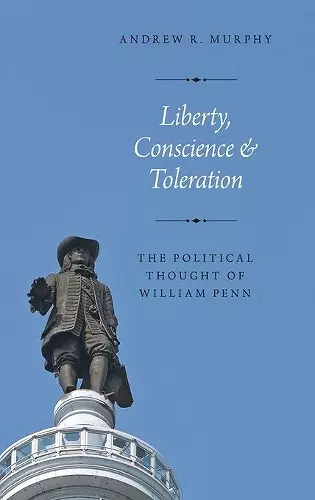Liberty, Conscience, and Toleration
The Political Thought of William Penn
Format:Hardback
Publisher:Oxford University Press Inc
Published:28th Jul '16
Currently unavailable, and unfortunately no date known when it will be back

In a seventeenth-century English landscape populated with towering political and philosophical figures like Hobbes, Harrington, Cromwell, Milton, and Locke, William Penn remains in many ways a man apart. Yet despite being widely neglected by scholars, he was a sophisticated political thinker who contributed mightily to the theory and practice of religious liberty in the early modern Atlantic world. In this long-awaited intellectual biography of William Penn, Andrew R. Murphy presents a nuanced portrait of this remarkable entrepreneur, philosopher, Quaker, and politician. Liberty, Conscience, and Toleration focuses on the major political episodes that attracted William Penn's sustained attention as a political thinker and actor: the controversy over the Second Conventicle Act, the Popish Plot and Exclusion Crisis, the founding and settlement of Pennsylvania, and the contentious reign of James II. Through a careful examination of writings published in the midst of the religious and political conflicts of Restoration and Revolutionary England, Murphy contextualizes the development of Penn's thought in England and America, illuminating the mutual interconnections between Penn's political thought and his colonizing venture in America. An early advocate of representative institutions and religious freedom, William Penn remains a singular figure in the history of liberty of conscience. His political theorizing provides a window into the increasingly vocal, organized, and philosophically sophisticated tolerationist movement that gained strength over the second half of the seventeenth century. Not only did Penn attempt to articulate principles of religious liberty as a Quaker in England, but he actually governed an American polity and experienced firsthand the complex relationship between political theory and political practice. Murphy's insightful analysis shows Penn's ongoing significance to the broader study of Anglo-American political theory and practice, ultimately pointing scholars toward a new way of understanding the enterprise of political theory itself.
Liberty, Conscience, and Toleration is a masterful achievement, one as remarkable for its careful treatment and painstaking analysis of early modern toleration and liberty of conscience as for its insightful reflections on political theory, practice and genre. Assessing the wide sweep of Penn's writings and actions serves as an exemplary opportunity not only to reflect on theory and its complex and at times unexpected relationship to practice but also to see more clearly the ways in which political theorizing responds to context, shapes the embodied and performative dimensions of protest and resistance, resists entrenched and coercive power, and protects religion, prudence and civil interest. * Vicki Hsueh, History of Political Thought *
In the process of interpreting William Penn as both political theorist and political activist, Murphy not only examines the importance of William Penn for understanding political theory and action in the early modern Atlantic world but also employs Penn's career as a model for understanding "the importance of social roles and locations in the genesis and reception of political theory". He has developed a productive strategy for interpreting early modern religious and political thought. * W. Clark Gilpin, Journal of Religion *
In this latest intellectual biography of William Penn, Andrew R. Murphy draws on his exploration of the relationship between Penn's tolerationist writings and his political engagement to argue for his greater inclusion in the canon of early modern political theory. Murphy explicitly presents his study as a response to the methodological challenge of the Cambridge School, and the recent renewal of scholarly interest in the Restoration era and the Atlantic world. He argues that Penn's significance is obscured by the 'twists and turns of his political career', and yet he 'possesses all the hallmarks of a political theorist as most scholars would understand the term'. In this sense, Liberty, conscience and toleration points beyond the mere study of Penn as an individual, to propose a fundamental reconfiguration of how the canon - and indeed, theory itself - is understood. * MADELEINE WARD, Wolfson College, Oxford, Journal of Ecclesiastical History *
ISBN: 9780190271190
Dimensions: 160mm x 236mm x 23mm
Weight: 598g
320 pages